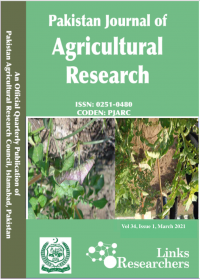Efficacy of Botanical Insecticides Against, Batrachedra amydraula on Phoenix dactylifera at Field Conditions
Efficacy of Botanical Insecticides Against, Batrachedra amydraula on Phoenix dactylifera at Field Conditions
Wali Muhammad Mangrio1*, Faheem Ahmed Jatoi1, Hakim Ali Sahito1, Fahmeeda Imdad Sahito2, Bhugro Mal3 and Naseem Qureshi4
ABSTRACT
Lesser date moth, a potential key insect pest species, extremely harming fruit of Phoenix dactylifera L, inducing tremendous date fruit yield and economic lossess. The research study was carried out to evaluate the efficacy of bio-rational insecticides against Batrachedra amydraula (Meyrick) at Taluka Kingri, District Khairpur under field conditions during, 2020-21. The four different bio-rational insecticides viz., (T1) = Azadirachta indica oil, (T2) = Azadirachta indica leaves extract, (T3)= Calotropis gigantea leaves, (T4) = Citrullus colocynthis fruit were applied against B. amydraula population and (T5)= as control. The result revealed that neem oil caused maximum larvae reduction % in all three replications at (50.25%), (43.30%), (34.04%) overall (42.53%) in both years. Neem leaves extract (40.95%), (35.83), (34.08) overall (36.95%). C. gigantea (30.43%), (23.60%), (22.60%) overall (25.54%), and C. colocynthis (25.19%), (23.43%), (26.25%), overall (24.96%). There was significant effect of all the botanical insecticides but neem oil proved with best efficacy against this potential pest, hence recommended. Given district is regarded as the date palm biodiversity centre, here more than three hundred date palm varieties are being grown. It is strongly needed to develop new strategies with combination of commercial botanical pesticides. As an alternative and minimize the toxic chemical pesticides, because botanical insecticides are sustainable control mechanisms that show the potential to earn profitable yield.
To share on other social networks, click on any share button. What are these?







